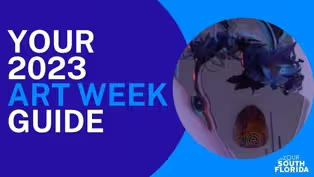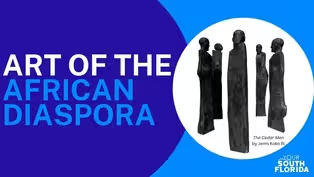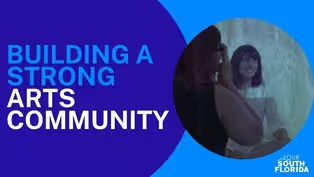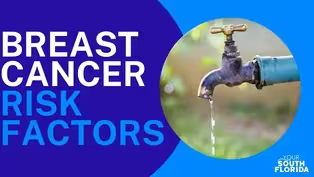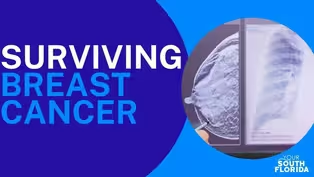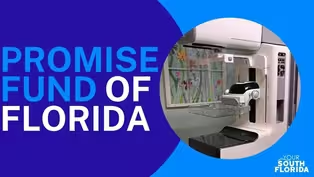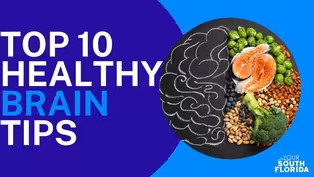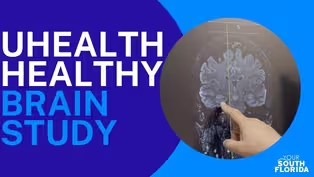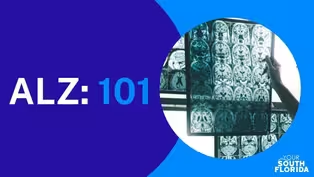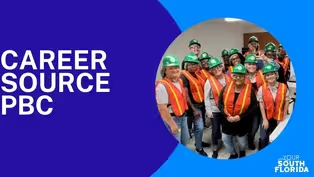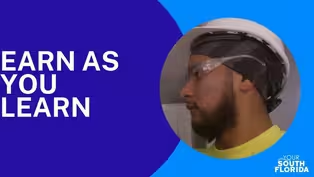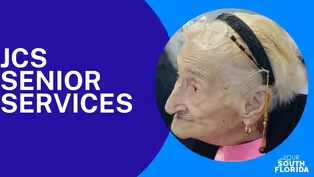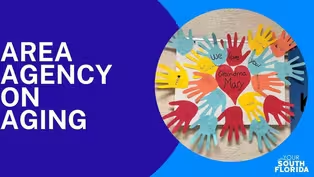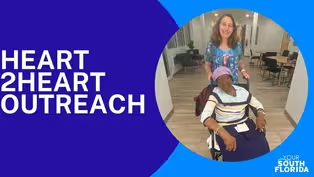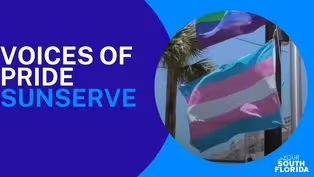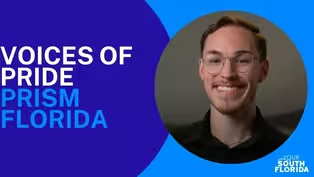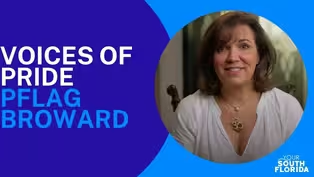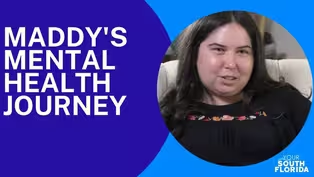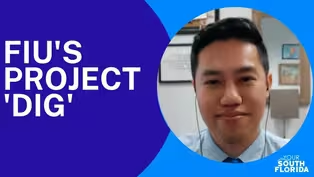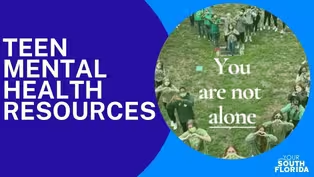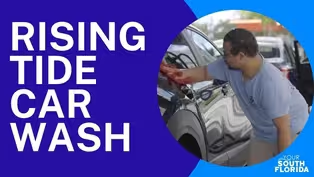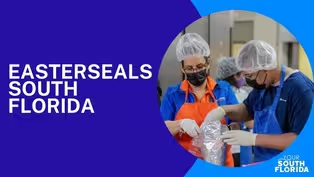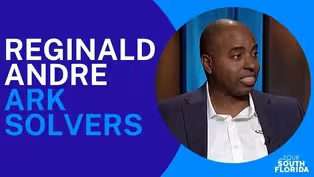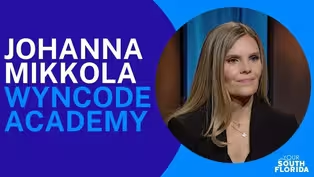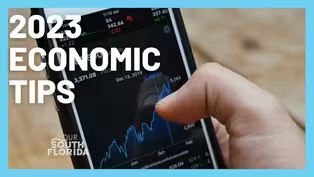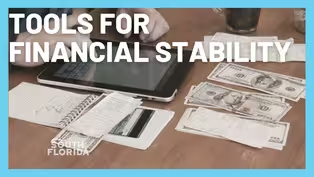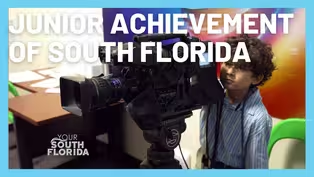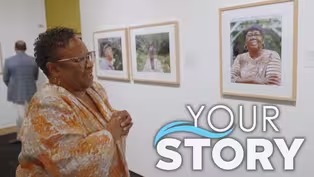Your South Florida
All You Need to Know About Alzheimer's
Clip: Season 7 | 12m 58sVideo has Closed Captions
We shed light on the latest developments in Alzheimer's care and support.
Jennifer Braisted, Director of Government Affairs for the Alzheimer's Association Southeast Florida Chapter, joins us to shed light on the latest developments in Alzheimer's care and support. She discusses the differences between dementia and Alzheimer's, the disparities in diagnosis across different populations, and the challenges faced by caregivers.
Problems playing video? | Closed Captioning Feedback
Problems playing video? | Closed Captioning Feedback
Your South Florida is a local public television program presented by WPBT
Your South Florida
All You Need to Know About Alzheimer's
Clip: Season 7 | 12m 58sVideo has Closed Captions
Jennifer Braisted, Director of Government Affairs for the Alzheimer's Association Southeast Florida Chapter, joins us to shed light on the latest developments in Alzheimer's care and support. She discusses the differences between dementia and Alzheimer's, the disparities in diagnosis across different populations, and the challenges faced by caregivers.
Problems playing video? | Closed Captioning Feedback
How to Watch Your South Florida
Your South Florida is available to stream on pbs.org and the free PBS App, available on iPhone, Apple TV, Android TV, Android smartphones, Amazon Fire TV, Amazon Fire Tablet, Roku, Samsung Smart TV, and Vizio.
Providing Support for PBS.org
Learn Moreabout PBS online sponsorshipAlzheimer's, it's a terrible, debilitating disease that robs people of their independence and puts a huge strain on families and caregivers.
It is the most common form of dementia, affecting memory, thinking, and behavior.
Unlike typical signs of aging, it's a progressive disease that eventually becomes so severe it affects daily life and self-care.
More than 6 million people in the United States live with Alzheimer's, many of them right here in Florida.
Of our 65 and older population, nearly 600,000 seniors are suffering from Alzheimer's, one of the largest populations in the country.
And treating these patients comes with a huge price tag.
According to the Alzheimer's Association, the cost of care for those with Alzheimer's and other forms of dementia is expected to be a whopping $345 billion this year, growing to nearly $1 trillion by the year 2050.
This financial burden leads many to rely on family members to step in as caregivers.
In 2022 alone, unpaid Florida caregivers work more than a billion hours, a value of over $23 billion.
The stress brought on by being an unpaid caregiver has health impacts as well, with many experiencing a decline in their own health, including depression.
Fortunately, there is some help on the horizon, with both the federal government and Florida announcing new initiatives to provide resources and support.
And in July, for the first time, the FDA approved a new Alzheimer's drug meant to slow the progression of the disease for those in early stages.
Joining me now to talk more about all of this is Jennifer Braisted, director of government affairs for the Alzheimer's Association Southeast Florida Chapter.
Jennifer, thank you so much for joining me.
Really appreciate it.
Thank you for having me.
Yeah, so kind of walk us through the difference between dementia and Alzheimer's.
People age, and we all start to kind of forget things.
Sure.
But there's a difference, so talk to us about that.
Absolutely, so Alzheimer's is the most common form of dementia.
And when you're talking about dementia, it's an umbrella term, and there's different types of dementia, but dementia really covers a bunch of different symptoms that affect memory and thinking.
But Alzheimer's, it's not a normal part of aging.
Sometimes people think, oh, you get old, you get Alzheimer's, or you get another type of dementia.
That is not true, it is not a normal part of aging.
But like you said, there are some things that are part of the normal aging process.
So when looking at Alzheimer's, you really look at the warning signs.
And so, for instance, one of the main warning signs is difficulty completing familiar task.
So if you are someone who makes a recipe, and that is something that you do on a weekly basis, but all of a sudden you start having issues with that.
You're putting in the wrong ingredients, your family members notice different taste, that's something to look out for.
That really, that ability, when it affects your normal everyday life.
You're forgetting appointments, you're needing post-it notes everywhere you go.
But a instance of normal aging would be forgetting a person's name but then remembering it later.
[Pam] Right.
That would be normal.
[Pam] That's normal.
But if it's something that's-- Or forgetting your keys or something like that, you left your cell phone at home.
[Jennifer] Right.
That's normal.
If you're able to find your keys, and backtrack and be like, "Okay, well I was in this room and I was in that room."
Right.
Really, if you're able to do that comprehension and go through your steps, that's normal.
But, and then a lot of times, we'll say if you're putting your keys in the fridge, that's an...
But people misplace things and put 'em there.
But really, unless you forget what the key does, that's a real concern.
So what we're also seeing is, according to the CDC, Alzheimer's is on the rise.
Yes.
Especially in certain populations, like the Latino population and the African-American population.
What's going on here?
Yes.
So we are seeing that rise in numbers, but the big thing is, with the African-American population, they are twice as likely to develop Alzheimer's.
And Hispanics are one and a half times more likely to develop Alzheimer's disease, as opposed to Caucasian Americans.
And there's also the reality that many in the Hispanic and African-American populations are also having more difficulties and barriers to access healthcare.
We also see that they are being diagnosed later in life, and they also have a higher risk of chronic conditions like hypertension, other cardiovascular diseases, and diabetes, which have a strong correlation of also developing a form of dementia.
Let's talk a little bit about, obviously when somebody gets to that stage, they need care.
Yes.
They need a caregiver, a caretaker.
Correct.
A lot of times, and we mentioned it at the top of the show, and there's so much money spent on billions of unpaid hours for people who start taking care of their loved ones.
[Jennifer] Yeah.
They quit their jobs in many instances.
[Jennifer] Yes.
How hard is this on caregivers?
It is incredibly difficult, because caregivers are devoting so much time and energy to caring for their loved ones.
It has a tremendous impact.
Alzheimer's is not just a disease that affects the individual, it affects the entire family.
It's systemic in the way it reaches.
But caregivers, they're, 66% of caregivers here in Florida have another chronic condition that they're dealing with while they care for someone.
And then also, over almost 30% of caregivers in Florida have been diagnosed with clinical depression.
So we need to be able to support caregivers, and not only support their physical, but their mental health as well.
Yeah, they need care as well, right?
[Jennifer] They do, absolutely.
And in fact, we were going to have a caregiver on the program, but her mother, who she cares for, had an issue.
And that's not uncommon, right?
No.
And you talked about the workplace.
And some people, they have to quit their jobs, they have to cut back on their hours to go to a part-time status.
But also, while they're working full-time, they may be having to come in late or leave early due to their demands as a caregiver.
And many also are, about 25% are part of that sandwich generation, where they're caring for a young child, and then also caring for a parent, a grandparent as well.
We know a lot of strides have been made as far as getting funding to help treat Alzheimer's and also support caregivers.
[Jennifer] Yes.
[Pam] In fact, the White House has something called the GUIDE Model.
[Jennifer] Yes.
And then also, the state of Florida has increased spending with over $50 million for what they call the Alzheimer's Disease Initiative Program.
Yes.
So talk about how important that is.
It's incredibly important.
It's really the highest funded Alzheimer's program in the country.
So when it comes to the Alzheimer's Disease Initiative, which is here in Florida, this provides funding in a few different facets.
The first one is actually for the memory disorder clinics, which there's 17 across the state, where people can go to get cognitive screenings and get a diagnosis.
So that's incredibly important for people if they have concerns about their loved one and the warning signs.
But then also another aspect that, is respite care, which is so critical for caregivers.
Because one of the big things that we always say to caregivers is, you have to take care of yourself.
Sure.
But as we were discussing, they're not going to doctor's appointments, they're dealing with chronic conditions, and then they also are dealing with their own mental decline, with their mental health.
But this respite funding gives them the opportunity to utilize either adult daycare for their loved one or have an in-home caregiver come in.
And we do have significant wait list in the state, but with these increases in funding, we're able to get more individuals off the wait list so they are able to take time to go to their doctor's appointments.
My goodness, go to the grocery store, maybe get a haircut.
[Pam] Take a break.
Take a break.
Just a little of a break, right?
Go to dinner with your spouse or something like that.
Absolutely.
Wow, let's talk about the drug, Leqembi.
[Jennifer] Yes.
[Pam] Which was just approved by the FDA over the summer.
[Jennifer] Yes.
Talk a little bit about how some people are calling this, really, a game changer, right?
Absolutely, so as you mentioned, the FDA traditionally approved the drug called Leqembi.
We really are entering an era of treatment now.
This drug is one of the first of its kind to actually slow the progression of its disease.
So in the past, when you said there were drugs for Alzheimer's, they really could help alleviate some of the symptoms of Alzheimer's, but they could do nothing for the actual disease.
So these were actually removing plaque from the brain.
And so, they've had an effective rate, but really gives the opportunity for loved ones, in consultation with their healthcare professional, but potentially to get more time.
that gives them the ability to maybe keep some of their independence.
They can drive a little longer, they can be able to go to their loved ones graduations and ballet recitals.
Right.
And just have their independence, and keep them at home longer.
But this is something for early stages.
Correct.
In consultation with your physician because there have been some side effects too that people need to know about, right?
There has been.
Yeah.
So, of course with anything, you have to talk to your doctor.
This may not be right for some people.
As you said, it's really for those who have mild cognitive impairment or in the very early stages of Alzheimer's disease.
Those are the only two groups where it is effective.
And as you mentioned, there have been some side effects of some brain swelling, brain bleeding.
There are individuals who, through their genetic makeup, are at a higher risk.
So if a doctor does think that you're eligible, they'll have to do some testing to make sure, just so you know what the potential risks are going in.
Sure, and this drug does come with a high cost.
I believe it's what, $26,500 for the year?
Yes, yes.
And you got to meet the deductible of 5,000 first.
Correct, about 20%, yeah.
Yeah, so talk about how that is covered for people who really need it.
Yeah, so one of the big things though is that Medicare did decide, with the traditional approval in July, to cover the drug 'cause...
So that's a real game changer.
Hopefully private insurers will step up as well, and begin to cover.
But again, as you said, it is that 20% deductible, which is about right now, $5,000, so.
Right.
The Alzheimer's Association, others really advocating to ensure that people do have access to these treatments.
And let's talk about the Alzheimer's Association for a moment.
[Jennifer] Sure.
And what an incredible resource it is for people.
[Jennifer] Yes.
I mean, I was navigating the website and saw it's quite user-friendly.
[Jennifer] It is.
Can easily find information on there.
So talk about the resources that you provide.
Absolutely, so one of our great things is our website, but also we have a 24/7 helpline.
That's 800-272-3900, that is available 365 days a year in over 200 different languages.
You can call at any time, and you're going to speak to a master's level dementia specialist.
[Pam] Wow.
Who's going to be able to answer any questions.
Maybe you have a neighbor, and they're doing some odd behaviors, and you think that there could be some signs.
You could find out information on that.
Could be your loved one.
A lot of times our calls will actually spike up during the holidays.
So people come home after Thanksgiving, they go home.
Maybe their loved one who is very tidy, things are messy, they don't know what's going on.
Yeah.
So people, we do see a lot of spike in calls during the holidays.
But people can call us with inquiries.
Also, if you're a caregiver, you are in the trenches in this journey dealing with someone.
And maybe it's in the evening and you can't get your loved one to go to sleep.
They're restless, they're acting out, there's behaviors.
You can call the helpline and we will walk you through to help you navigate that situation.
That's a great resource.
And talk real quick about The Brain Bus, what is that?
Yes, so The Brain Bus is a Florida specific initiative.
It is our mobile outreach unit.
We have two brain buses that go across the state, and they serve, going to underserved areas, to educate them on brain health, the warning signs of Alzheimer's, where they can get a diagnosis, like the memory disorder clinics.
[Pam] Right.
And also, if there's caregivers, we can provide caregiver consultations and support for them as well.
Jennifer, thank you so much.
Thank you.
It was great chatting with you.
We've learned a lot, and we know that the Alzheimer's Association is a great resource, so thank you.
Thank you.
Your Expert Guide to Miami Art Week 2023
Video has Closed Captions
Clip: S7 | 28m 44s | We share tips for your best Miami Art Week 2023 experience. (28m 44s)
Discover The Art Transforming Opa-locka
Video has Closed Captions
Clip: S7 | 10m 27s | Discover The Art Transforming Opa-locka. (10m 27s)
Dennis Scholl on Housing Help for Artists
Video has Closed Captions
Clip: S7 | 8m 51s | Dennis Scholl discusses South Florida's burgeoning art scene & its impact on the economy. (8m 51s)
Video has Closed Captions
Clip: S7 | 9m 38s | Breast cancer researchers are studying an alarming trend in South Florida. (9m 38s)
Latest TIPS for Breast Cancer Prevention and Treatment.
Video has Closed Captions
Clip: S7 | 11m 31s | Join us in this important conversation about breast cancer prevention and treatment. (11m 31s)
Connecting Women to FREE Mammograms
Video has Closed Captions
Clip: S7 | 6m 14s | Early detection is vital to breast cancer survival. (6m 14s)
TOP 10 Tips to Help You LOVE Your Brain
Video has Closed Captions
Clip: S7 | 6m 53s | Learn about early detection and lifestyle changes for maintaining brain health. (6m 53s)
Healthy Brains Helping Researchers Fight Alzheimer's
Video has Closed Captions
Clip: S7 | 7m 9s | We look at how to better treat and prevent Alzheimer’s and related dementias. (7m 9s)
All You Need to Know About Alzheimer's
Video has Closed Captions
Clip: S7 | 12m 58s | We shed light on the latest developments in Alzheimer's care and support. (12m 58s)
Vocational & Workforce Resources
Video has Closed Captions
Clip: S7 | 10m 55s | CareerSource PBC is helping job seekers learn the skills they need. (10m 55s)
Video has Closed Captions
Clip: S7 | 10m 44s | Get the details on a new program making higher education more accessible. (10m 44s)
Video has Closed Captions
Clip: S7 | 5m 7s | We get an inside look at how apprenticeships can be a win-win for students and businesses. (5m 7s)
JCS Providing Meals & Community
Video has Closed Captions
Clip: S7 | 6m 2s | Jewish Community Services of South Florida works to maintain the health of seniors. (6m 2s)
Helpline for Older Adults & Caregivers
Video has Closed Captions
Clip: S7 | 9m 35s | Learn how the Area Agency on Aging of Palm Beach/Treasure Coast is helping older adults. (9m 35s)
Video has Closed Captions
Clip: S7 | 8m 55s | Heart2Heart Outreach of South Florida provides care for lonely seniors. (8m 55s)
Voices of PRIDE: Transgender Community
Video has Closed Captions
Clip: S7 | 5m 59s | We visit SunServe in Wilton Manors to hear from members of the Transgender community. (5m 59s)
Voices of PRIDE: Gen Z & LGBTQ+
Video has Closed Captions
Clip: S7 | 3m 27s | PRISM is a non-profit providing resources to South Florida' LGBTQ+ Gen Z community. (3m 27s)
Voices of PRIDE: A Parent's Perspective
Video has Closed Captions
Clip: S7 | 3m 17s | Lisa McCourt shares her perspective as the mother of a Transgender daughter. (3m 17s)
Video has Closed Captions
Clip: S7 | 4m 12s | We profile Maddy Tasini and her mental health journey. (4m 12s)
FIU Addresses Shortage of School Mental Health Professionals
Video has Closed Captions
Clip: S7 | 6m 34s | FIU has a new program that helps students with mental health issues. (6m 34s)
Mental Health Resources for Teens & Families
Video has Closed Captions
Clip: S7 | 12m 41s | Host Arlene Borenstein looks into local resources for at-risk teens and their families. (12m 41s)
Rising Tide Car Wash's Neurodivergent Workforce
Video has Closed Captions
Clip: S7 | 7m 3s | Rising Tide Car Wash is a successful business thanks to it's non-traditional workforce. (7m 3s)
Culinary Arts Program for Neurodivergent Students
Video has Closed Captions
Clip: S7 | 6m 1s | For decades, Easterseals South Florida has been helping neurodivergent students. (6m 1s)
Andrew Gonzalez l Road to Entrepreneurship
Video has Closed Captions
Clip: S7 | 7m 30s | Miami native Andrew Gonzalez followed his dream of making and selling late-night cookies. (7m 30s)
Reginald Andre l Road to Entrepreneurship
Video has Closed Captions
Clip: S7 | 7m 55s | Hear Reginald Andre talk about his inspirational entrepreneurial journey. (7m 55s)
Johanna Mikkola l Road to Entrepreneurship
Video has Closed Captions
Clip: S7 | 11m 6s | Johanna Mikkola saw the value in bringing a unique brand of coding bootcamps to S. Florida (11m 6s)
Your 2023 Economic Tips l Your South Florida
Video has Closed Captions
Clip: S7 | 9m 42s | Dr. Albert Williams shares his tips for financial health. (9m 42s)
Tools for Financial Stability with United Way Miami
Video has Closed Captions
Clip: S7 | 6m 27s | Nearly 6 out of 10 Miami households are living in or are on the verge of poverty. (6m 27s)
Junior Achievement of South Florida l Your South Florida
Video has Closed Captions
Clip: S7 | 6m 20s | Junior Achievement of South Florida teaches students about finances and building a career. (6m 20s)
Photographing Boca Raton’s Oldest Neighborhood | Your Story
Video has Closed Captions
Clip: S7 | 7m 22s | Founded in 1915, Pearl City is the oldest neighborhood in Boca Raton. (7m 22s)
Providing Support for PBS.org
Learn Moreabout PBS online sponsorshipSupport for PBS provided by:
Your South Florida is a local public television program presented by WPBT
